
Experimental and Computational Multiphase Flow
Scope & Guideline
Elevating Standards in Fluid Flow and Transfer Processes
Introduction
Aims and Scopes
- Multiphase Flow Dynamics:
Research on the dynamics of multiphase flows, including gas-liquid, liquid-solid, and gas-solid interactions, focusing on flow patterns, phase interactions, and transport phenomena. - Computational Fluid Dynamics (CFD) Applications:
Utilization of advanced CFD techniques to model and simulate various multiphase flow scenarios, addressing challenges such as turbulence, phase change, and interfacial dynamics. - Experimental Investigations:
Conducting laboratory experiments to validate computational models and explore multiphase flow behaviors under controlled conditions, providing empirical data for theoretical frameworks. - Heat Transfer and Thermal Management:
Studies focusing on heat transfer mechanisms in multiphase systems, including boiling, condensation, and thermal management applications in engineering systems. - Environmental and Health Applications:
Exploration of multiphase flow phenomena in environmental contexts, such as aerosol dispersion, pollutant transport, and implications for health and safety. - Innovative Measurement Techniques:
Development and application of novel measurement techniques for characterizing multiphase flows, enhancing the accuracy and reliability of data collection.
Trending and Emerging
- Advanced Simulation Techniques:
There is a growing focus on advanced simulation techniques such as large eddy simulations (LES) and the volume-of-fluid (VOF) method, which enhance the accuracy of multiphase flow predictions. - Interfacial Dynamics and Bubble Behavior:
An increase in studies addressing interfacial dynamics, bubble formation, and breakup mechanisms, which are critical for applications in chemical processing and environmental engineering. - Heat Pipe Technology and Thermal Management:
Research on heat pipe technology has gained momentum, reflecting its importance in thermal management systems, particularly in nuclear and electronics cooling applications. - Environmental Impact Studies:
Emerging themes include the environmental impacts of multiphase flows, particularly in relation to aerosol dispersion and pollutant transport, highlighting the relevance of multiphase flow research to public health. - Integration of Machine Learning in Flow Predictions:
The integration of machine learning techniques to optimize and predict multiphase flow behaviors is on the rise, showcasing the intersection of traditional fluid dynamics and modern computational methods.
Declining or Waning
- Basic Theoretical Models:
Research focusing solely on basic theoretical models of multiphase flows has seen a decrease, as the field shifts towards more applied and complex simulations. - Single-Phase Flow Studies:
There is a noticeable decline in papers centered on single-phase flow studies, as the emphasis increasingly moves towards multiphase interactions and their implications. - Traditional Heat Transfer Mechanisms:
Research specifically on traditional heat transfer mechanisms without the integration of multiphase phenomena has diminished, reflecting a shift towards more integrated thermal management solutions. - Niche Applications of Multiphase Flow:
Areas with very specific applications, such as niche industrial processes, are less frequently explored, possibly due to a focus on broader, more impactful applications.
Similar Journals
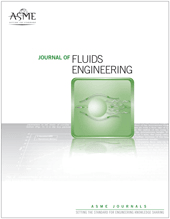
JOURNAL OF FLUIDS ENGINEERING-TRANSACTIONS OF THE ASME
Advancing Knowledge in Mechanical EngineeringJOURNAL OF FLUIDS ENGINEERING-TRANSACTIONS OF THE ASME, published by the renowned American Society of Mechanical Engineers (ASME), stands as a pivotal platform for disseminating cutting-edge research in the field of mechanical engineering, specifically focusing on fluid mechanics and its diverse applications. With an established history dating back to 1897, this journal features research that pushes the boundaries of knowledge and technology in areas such as fluid dynamics, thermal engineering, and hydrodynamics. Although it is not an open-access journal, it maintains rigorous peer-review standards, ensuring the publication of high-quality scholarly articles that contribute to the academic and professional community. In the latest rankings, it holds a respectable position within the Q2 category of mechanical engineering journals, reflecting its significant impact, as evidenced by its Scopus rank of #204 out of 672, placing it in the 69th percentile. Researchers, professionals, and students alike will find this journal to be a vital resource for the latest developments and innovative insights in fluids engineering.
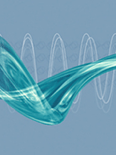
Annual Review of Fluid Mechanics
Pioneering Insights for Fluid Mechanics ScholarsThe Annual Review of Fluid Mechanics, published by Annual Reviews, is a premier journal in the field of fluid mechanics, dedicated to advancing our understanding of fluid behavior through comprehensive and critical reviews of contemporary research. With an impressive impact factor that reflects its stature—ranking Q1 in Condensed Matter Physics and positioned 4th out of 434 in Scopus’s Physics and Astronomy category—it stands as a vital resource for researchers, professionals, and students alike. Since its inception in 1970, the journal has provided vital insights and synthesized knowledge that drive innovations and applications across various scientific disciplines. Although it does not offer open access, the journal ensures rigorous editorial standards and captivating content that contributes meaningfully to the academic discourse in fluid dynamics. Published annually, the Annual Review of Fluid Mechanics continues to be a cornerstone for anyone interested in the complexities of fluid movement and its implications in both theoretical and practical contexts.

Frontiers in Heat and Mass Transfer
Unveiling New Horizons in Transport PhenomenaFrontiers in Heat and Mass Transfer is a premier open-access journal published by TECH SCIENCE PRESS that focuses on the interdisciplinary field of heat and mass transfer. Established in 2010, this journal has been pivotal in disseminating high-quality research aimed at advancing the understanding of energy and material transport phenomena. With an impressive commitment to open access, it ensures that all published articles are readily available to researchers, practitioners, and students globally, promoting knowledge sharing and collaboration. The journal currently holds a Q3 ranking in key categories such as Engineering, Materials Science, and Physics and Astronomy, as well as notable positioning in Scopus rankings. With a forward-looking scope extending from 2010 to 2024, Frontiers in Heat and Mass Transfer continues to be an essential platform for innovative research, fostering the development of practical applications across various scientific and engineering domains. We invite you to explore the latest contributions to this evolving field and consider this journal as a vital resource for your academic and professional growth.
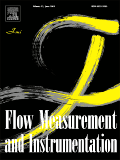
FLOW MEASUREMENT AND INSTRUMENTATION
Connecting Theory and Practice in InstrumentationFLOW MEASUREMENT AND INSTRUMENTATION, published by Elsevier Science Ltd, serves as a vital resource for researchers and professionals in the fields of Instrumentation, Electrical and Electronic Engineering, Computer Science Applications, and Modeling and Simulation. With an impressive trajectory since its inception in 1989 and extending to 2024, this journal has gained a notable reputation, ranking in the upper quartiles of various categories within the 2023 Scopus metrics, reflecting its significant contribution to advancing knowledge in flow measurement technologies and methodologies. Although it does not offer Open Access options, the journal is well-regarded for its rigorous peer-review process, ensuring high-quality, impactful research dissemination. The journal's emphasis on empirical studies and innovative instrument design establishes it as an essential platform for disseminating cutting-edge findings that facilitate practical applications and inform future research directions. Positioned within the United Kingdom, it attracts a global readership dedicated to the continuous enhancement of measurement sciences and engineering innovations.
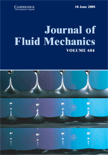
JOURNAL OF FLUID MECHANICS
Pioneering research in the realm of fluid mechanics.JOURNAL OF FLUID MECHANICS, published by Cambridge University Press, is a premier international journal recognized for its significant contributions to the field of fluid dynamics. With an esteemed impact factor that places it in the Q1 category across multiple disciplines, including Applied Mathematics, Condensed Matter Physics, Mechanical Engineering, and Mechanics of Materials, this journal serves as a vital resource for researchers and practitioners alike. Established in 1956, it provides a platform for innovative and high-quality research articles that advance the understanding of fluid mechanics phenomena. The journal's rankings underscore its prestige, with Scopus recognizing it among the top journals in its category. Although it currently does not offer open access, the journal remains accessible to educational institutions and professionals in the United Kingdom and beyond. By addressing critical and emerging topics in fluid mechanics, JOURNAL OF FLUID MECHANICS is essential for those striving to push the boundaries of knowledge and application in this dynamic field.

Case Studies in Thermal Engineering
Fostering Global Collaboration in Thermal EngineeringCase Studies in Thermal Engineering, published by ELSEVIER, stands as a premier platform for innovative research and analysis in the field of thermal engineering since its inception in 2013. With a robust Open Access model, this journal ensures that groundbreaking findings in fluid flow and transfer processes are readily accessible to a global audience, fostering collaboration and knowledge sharing across disciplines. Situated in the United Kingdom, the journal boasts an impressive impact factor, reflecting its status in the first quartile (Q1) for both engineering (miscellaneous) and fluid flow and transfer processes, as noted in the latest Scopus rankings. Researchers and professionals alike recognize its significance, ranking 9th out of 96 in Chemical Engineering and achieving a notable 91st percentile in its category. By publishing high-quality case studies, the journal aims to advance understanding and applications of thermal engineering principles, making it an essential resource for those looking to stay at the forefront of this dynamic field.
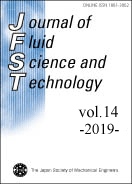
Journal of Fluid Science and Technology
Elevating Understanding of Fluid Transfer ProcessesThe Journal of Fluid Science and Technology, published by the Japan Society of Mechanical Engineers, serves as a pivotal platform for the dissemination of cutting-edge research in the fields of fluid mechanics and mechanical engineering. With an ISSN of 1880-5558, this Open Access journal has been dedicated to advancing the understanding of fluid flow and transfer processes since its establishment. As of 2023, it holds a significant position with a Q3 quartile ranking in both Fluid Flow and Transfer Processes and Mechanical Engineering categories. Researchers and practitioners are encouraged to explore the journal’s extensive collection of articles, contributing to the body of knowledge that impacts various practical applications in engineering and technology. The journal, which has established a reputation for quality amidst a competitive landscape, further fosters international collaboration and education by providing unrestricted access to its content. For professionals and students alike, the Journal of Fluid Science and Technology represents an invaluable resource for the latest findings and innovations in fluid dynamics and mechanical systems.

Fluids
Advancing fluid dynamics through open access research.Fluids is a leading open-access journal published by MDPI that commenced its publication in 2016, fostering a vibrant platform for the dissemination of high-quality research in the fields of Condensed Matter Physics, Fluid Flow and Transfer Processes, and Mechanical Engineering. Based in Switzerland, the journal has earned a prominent reputation, achieving a Q2 categorization in the latest 2023 rankings, indicating its significant impact within respective subject areas. Researchers and professionals will find Fluids an invaluable resource, as it not only facilitates the sharing of innovative studies but also provides open access to research findings, ensuring widespread visibility and utility. With a diversified editorial board and a commitment to exploration in fluid dynamics and related applications, Fluids aims to advance knowledge, foster collaboration, and inspire future research endeavors among its readership. As the journal converges into new frontiers from 2016 to 2024, it continues to be a pivotal reference for scholars and practitioners alike.
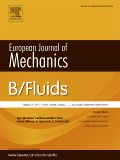
EUROPEAN JOURNAL OF MECHANICS B-FLUIDS
Unveiling the Mysteries of Fluid BehaviorThe EUROPEAN JOURNAL OF MECHANICS B-FLUIDS, published by Elsevier, is a prominent journal in the field of fluid mechanics, addressing the theoretical and experimental aspects of fluid behavior. Since its inception in 1990, this journal has consistently fostered a robust academic dialogue, maintaining a significant impact evidenced by its Q2 ranking in both Mathematical Physics and Physics and Astronomy categories as of 2023, placing it among the top publications in these disciplines. Researchers and professionals focusing on fluid dynamics will find a wealth of knowledge in its articles, which span broad topics pertinent to real-world applications as well as fundamental theories. While the journal is not open access, it offers critical insights that shape ongoing studies in fluid mechanics, making it an invaluable resource for anyone looking to deepen their understanding of the field. Located in the innovative environment of Amsterdam, Netherlands, the journal serves as a nexus for cutting-edge research and collaboration globally.

EXPERIMENTS IN FLUIDS
Connecting academia and industry through experimental insights.EXPERIMENTS IN FLUIDS is a prestigious journal in the field of fluid mechanics, published by SPRINGER, renowned for its rigorous peer-reviewed research and experimental studies that advance the understanding of fluid behavior in various contexts. With an ISSN number of 0723-4864 and an E-ISSN of 1432-1114, this journal has published influential works since its inception in 1983, maintaining a convergence of data and insights crucial for both academia and industry. Its impressive impact factor and ranking in the Q1 category for Computational Mechanics, Fluid Flow and Transfer Processes, Mechanics of Materials, and Physics and Astronomy underscore its significance in fostering high-quality research in these domains. Researchers and professionals benefit from the comprehensive access to experimental methodologies, innovative applications, and cutting-edge results that the journal provides without the Open Access model. The journal's offices located in New York, USA, facilitate its global outreach, making it an essential resource for scholars and practitioners seeking to deepen their expertise in fluid dynamics and related fields.